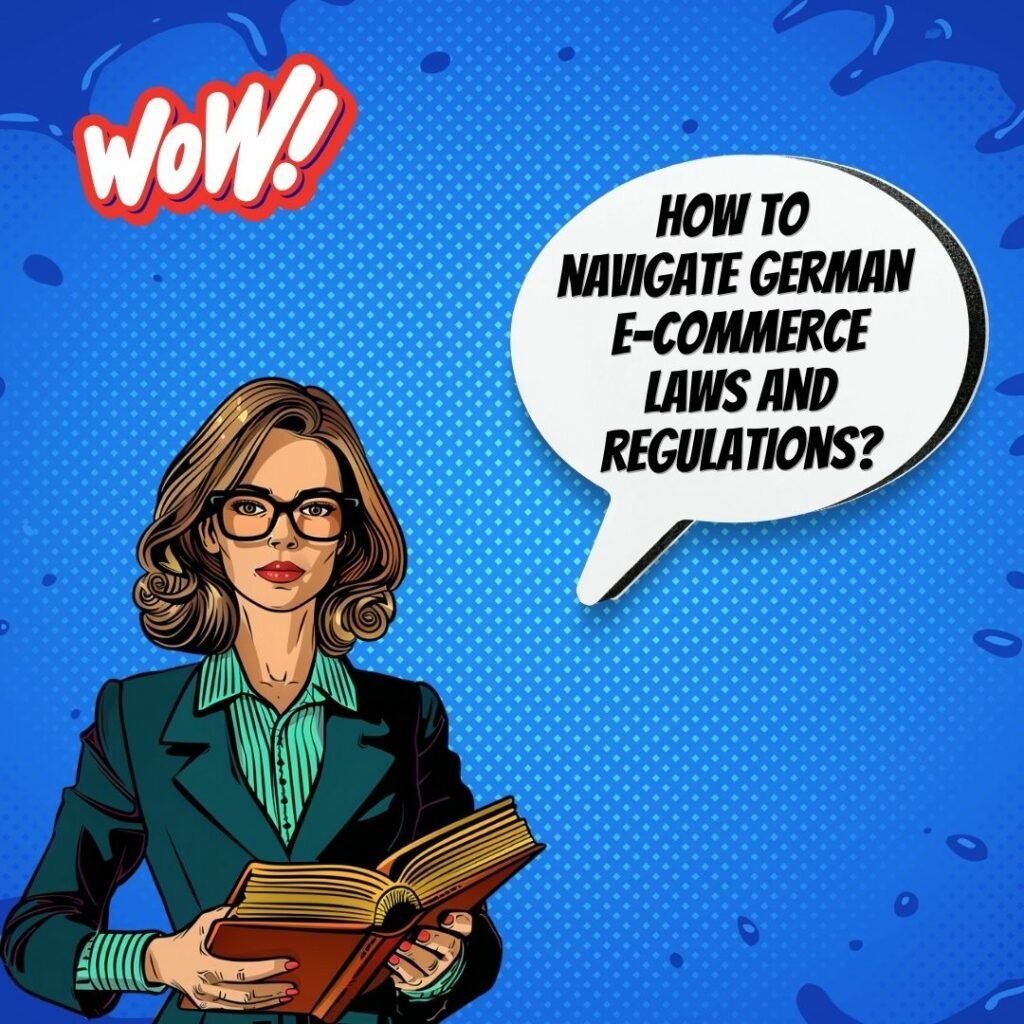Key Takeaways
✅ Compliance with Data Protection Regulations: Keeping up with the GDPR and BDSG is a must in Germany's e-commerce realm. Overlook this, and you risk capsizing under heavy fines. Remember, collecting that customer data means asking permission and keeping things locked down tight.
✅ Legal Requirements for Online Shops: Transparency isn't just a buzzword; it's the law. From clearly stating your company's details to ensuring your pricing doesn't puzzle customers, it's about making sure shoppers can trust and return to your online store.
✅ Tax Obligations and VAT Registration: Sailing past the 22,000 Euro revenue mark? Time to register for VAT. Get your taxes and contributions right, and you'll steer clear of the rocks of penalties waiting to trip up the unwary.

Introduction
Ever felt like you're navigating through a stormy sea when it comes to understanding German E-commerce Laws and Regulations? Well, you're not alone. The digital marketplace is booming, but with each wave of innovation comes a new set of rules to keep you on course. Whether you're launching a startup or steering an established brand through the waters of German online trade, knowing the legal ropes isn't just important—it's crucial for your business to thrive.
From the shores of consumer protection to the cliffs of privacy laws, let's explore the landscape together, uncover the secrets of success, and maybe even find a treasure map to profitability. Eager to keep your business buoyant and boost your ROI? Stay with me as we unlock actionable insights and groundbreaking information that could very well be the wind in your sails.
Top Statistics
| Statistic | Insight |
|---|---|
| Market Volume: | With online sales reaching €73.3 billion in 2020, Germany stands as the third-largest e-commerce market globally – that's no small feat. Seeing this kind of growth is like watching a tiny seed grow into a mighty tree. Can you imagine what businesses can achieve when they tap into this market? |
| User Spending: | Now picture this: 81% of Germans above 14 years are clicking away and filling virtual carts, each spending an average of €1,546 online. It's not just about the volume of people shopping; it's how much they're willing to spend. That's a whole lot of trust in digital storefronts. How does your business build and maintain that trust? |
| Fashion & Apparel's Slice: | This particular industry is leading the pack, carving out 28% for itself in 2020. It's like watching someone at a buffet — they know exactly what they want and they go for it without hesitation. What's your strategy to stand out in this crowded room? |
| Mobile Commerce's Push: | With nearly half the online purchases made on mobile devices, it's clear that Germans are shopping on the go – on trains, in cafes, you name it. Does your business make it easy for them? Imagine being at a party and the music is too loud; it's annoying, right? That's how customers feel about a clumsy mobile shopping experience. |
| Data Protection Standards: | Here's the twist: GDPR and the Federal Data Protection Act are watchful guardians of consumer data. It's like having a couple of big bouncers at the door, making sure everything's safe and sound. Now, how do you make sure your business isn't turning away customers because it didn't meet the bouncers' standards? |
Understanding German E-commerce Laws
Have you ever thought about selling products online in Germany? E-commerce in Germany is booming, but it's not as simple as just setting up shop. You need to get your head around the German e-commerce laws and regulations. Why? Well, for starters, it could save you a heap of trouble down the line. Knowing the rules of the game helps you play it better, right?
The Backbone of E-commerce Regulation
In Germany, the German Civil Code (BGB) is like the rulebook for commerce. It's where you find all the nitty-gritty on contracts, which is super important when you're selling things online. Then there's the German Telemedia Act (TMG), which is all about internet services, including aspects like the responsibility of service providers. But wait, there's more – your customers care about their privacy, so the German Data Protection Act (BDSG) and the EU General Data Protection Regulation (GDPR) should be your Bibles for handling customer data.
Consumer Rights and Online Selling
Imagine you've just bought something online but changed your mind. In Germany, consumers have that right to cancel, known as Widerrufsrecht. They also have the right to information (Informationspflichten), which basically means they need to know exactly what they're buying, and the right to warranty (Gewährleistung), which protects them if what they've bought isn't up to scratch. As an online retailer, you need to make sure you're giving all this info upfront. It's about being transparent and keeping your customers in the loop.
Crafting Online Contracts and T&Cs
Clicking 'agree' on a website might not always feel like signing a contract, but it is. In Germany, you need to make sure your online contracts are up to scratch. That means clear language and all the essential clauses such as payment terms, delivery details, and who's liable if something goes wrong. Your terms and conditions should be as easy to read as a bedtime story – this isn't the place for complicated jargon.
The Big Deal with Data Protection
Data protection is a hot topic. Under the GDPR, which applies in Germany too, businesses need to handle customer data with care. Principles like lawfulness, fairness, and transparency are not just nice to have; they're a must-have. The GDPR also talks about purpose limitation (only use the data for what you said you would), data minimization (only the necessary data), storage limitation (don't keep it forever), and integrity and confidentiality (keep it safe). Remember, getting consent for using people's data isn't just polite, it's required.
Playing Fair in Advertising and Marketing
Ever been misled by an ad? Germany doesn't take kindly to that. The German Act Against Unfair Competition (UWG) makes sure of it. This act keeps an eye on advertising so nobody's being fooled. Misleading ads are a no-go, and if you're making comparisons, they better be on the level. As for promotions and testimonials, you've got to follow the rules – no bending the truth to make a sale.
Staying Sharp and Compliant
Keeping up with all this might sound like a chore, but it's crucial if you're in the e-commerce game in Germany. Businesses need to stay informed and adjust to the latest legal updates. It might seem overwhelming at first, but taking these steps isn't just about avoiding fines; it's about building trust with your customers. And that's worth its weight in gold, wouldn't you say?
AI Marketing Engineers Recommendation
Recommendation 1: Personalize the User Experience Within Legal Limits: Data privacy and protection are big deals in Germany, thanks to laws like the GDPR. Show your customers you care by being transparent about how you handle their data. Personalize your e-commerce services, but always keep it above board. Use analytics to offer relevant products without snooping into personal lives. How? Well, ever heard of cookies that ask for permission? Use them. Also, regular audits of data practices can keep you in compliance, prevent fines, and build trust. Trust is everything, isn't it? Remember, a happy customer is a repeat customer.
Recommendation 2: Adapt to the Right to Return: Germans have a right to return online purchases within 14 days, no questions asked. How can you turn this regulation to your advantage? Here's an idea: Make the return process easy and hassle-free. Maybe even thank them for a return. Crazy, right? But think about it. A smooth return experience might just be the thing that brings the customer back. Plus, use the feedback to improve your service or product. Turn the "right to return" into the "right to impress".
Recommendation 3: Utilize Compliance as a Marketing Advantage: Flaunting your compliance with local e-commerce laws isn't just good practice, it's a great marketing tool. Ever considered badges or certificates on your site that shout, "We're compliant!"? They show you're secure and trustworthy, and Germans love that. Plus, with all the regulations, customers might even expect it. Use tools like trust seals from authorized bodies that validate your compliance. That little badge could boost confidence and, potentially, sales. Who wouldn't want to buy from someone they trust?
Relevant Links
- Maximize Your Affiliate Marketing Earnings in 2024
- ChatGPT for Marketers: Unleash Your Creative Potential
- AI in E-commerce: Revolutionize Your Online Sales Strategy
- Boost Your SEO and Paid Marketing with AI
- Stay Ahead: Top Digital Marketing Trends for 2024
Conclusion
So, let's take a minute to think about the journey we've been on, walking through the ins and outs of German e-commerce laws and regulations. Starting off, did you realize how vital it is to get a grip on all these rules if you're running an online shop or service targeting customers in Germany? It's the kind of stuff that can be a bit dry, but boy, is it important.
We talked about the big legal players, such as the German Civil Code and the GDPR—names that probably didn't mean much at first, but now you see them as the guardians of online trading in Germany. Remember how we looked into what businesses have to do to play fair with customers? Yep, that's not just good manners; that's the law. Things like the right to cancel an order, to get clear information, and to have solid warranties—are indispensable for trust.
Then there are the nitty-gritty details of setting up online contracts and terms and conditions. It's not just about dotting the i's and crossing the t's; it's about creating a transparent relationship with customers so they know they're dealing with someone they can trust. And in this big, connected world of ours, can we talk about data protection for a sec? Your business has to be a virtual Fort Knox when it comes to personal data. Otherwise, you might as well be handing out your customer's secrets on the street. Plus, you've got to market your stuff without stepping on toes or bending the truth.
Every point we've covered is a piece of a puzzle that, when put together, keeps you in good standing with the law—and your customers. You might be thinking, "Wow, that's a lot to keep up with." And you're right. But now, with all this knowledge, imagine how you can navigate confidently through the regulatory waters and steer your business to success, all while staying on the right side of the law. Isn’t that something worth investing your time and energy into?
FAQs
Question 1: What are the essential e-commerce laws that businesses must comply with in Germany?
Answer: The primary laws governing e-commerce in Germany include the German Civil Code (BGB), the Telecommunications Act (TKG), the Act Against Unfair Competition (UWG), and the Distance Selling Act (Fernabsatzgesetz).
Question 2: Are there specific requirements for online contracts in Germany?
Answer: Yes, online contracts must adhere to the German Civil Code (BGB) and the Distance Selling Act (Fernabsatzgesetz). These laws specify the information that must be provided to customers, such as contact details, cancellation rights, and delivery terms.
Question 3: What are the data protection regulations that e-commerce businesses must comply with in Germany?
Answer: E-commerce businesses must comply with the General Data Protection Regulation (GDPR) and the German Federal Data Protection Act (BDSG). These regulations govern the collection, processing, and storage of personal data.
Question 4: What are the requirements for online payment methods in Germany?
Answer: Online payment methods must comply with the Payment Services Directive (PSD2) and the German Payment Services Supervision Act (Zahlungsdiensteaufsichtsgesetz, ZAG). These regulations ensure the security and protection of online payments.
Question 5: Are there specific laws regarding product descriptions and advertising in German e-commerce?
Answer: Yes, the Act Against Unfair Competition (UWG) regulates product descriptions and advertising. This law prohibits misleading or deceptive practices and ensures that businesses provide accurate and complete information about their products.
Question 6: What are the consumer protection rights in German e-commerce?
Answer: Consumers in Germany have extensive protection rights, including the right to cancel online purchases within 14 days without providing a reason. The Distance Selling Act (Fernabsatzgesetz) and the German Civil Code (BGB) govern these rights.
Question 7: Are there specific regulations for shipping and returns in German e-commerce?
Answer: Yes, e-commerce businesses must comply with the Distance Selling Act (Fernabsatzgesetz) regarding shipping and returns. This law specifies the information that must be provided to customers, such as delivery times and return policies.
Question 8: What are the requirements for product safety and liability in German e-commerce?
Answer: E-commerce businesses must ensure that their products comply with the Product Safety Act (Produktsicherheitsgesetz) and the Product Liability Act (Produkthaftungsgesetz). These laws govern product safety and liability in Germany.
Question 9: Are there specific tax regulations that e-commerce businesses must comply with in Germany?
Answer: Yes, e-commerce businesses must comply with German tax laws, including value-added tax (VAT) and income tax. The tax obligations depend on the business structure, location, and revenue.
Question 10: What are the best practices for complying with German e-commerce laws and regulations?
Answer: E-commerce businesses should stay up-to-date with the latest laws and regulations, seek legal advice when necessary, and ensure that their online presence complies with all applicable laws and regulations. Regularly reviewing and updating policies, terms, and conditions can also help businesses maintain compliance.
Academic References
- Hoeren, T., & Pfeiffer, T. (2019). E-commerce Law in Germany: A Practical Guide. Kluwer Law International. This guide delves into the intricacies of German e-commerce laws, touching on crucial topics such as data protection and intellectual property while offering actionable tips for businesses.
- Schwenke, T., & Wende, C. (2017). E-Commerce in Germany: Legal Aspects and Opportunities. European Journal of Law and Technology, 8(1). In this article, the legal framework of German e-commerce is thoroughly examined, emphasizing adherence to consumer protection standards and the burgeoning opportunities in the market.
- Stiegler, S., & Duisberg, A. (2018). E-Commerce in Germany: Legal Challenges and Opportunities for International Businesses. Journal of International Commercial Law and Technology, 13(1). The piece highlights the challenges that international companies face when entering the German e-commerce scene, discussing the implications of taxation, payment procedures, and online content liability.
- Engelmann, C., & Hänel, J. (2019). Digital Consumer Law in Germany: Challenges and Opportunities for E-Commerce. Journal of European Consumer and Market Law, 8(1). This article focuses on how digital consumer law affects e-commerce in Germany, analyzing consumer rights and business obligations, especially in the context of the GDPR and the German Telemedia Act (TMG).












